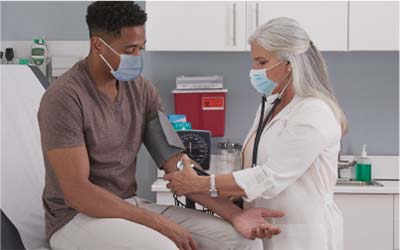Advanced care for brain, spine and neck conditions
- Patient-centered care team providing individualized treatment for brain and neurological conditions, including specialized stroke care
- Solutions for treating long-term health conditions as well as intervention to prevent future progression
- Use of modern techniques, to give you a highly accurate diagnosis
- Outstanding critical care for neurovascular patients
Whether you're looking for solutions to help with a long-term brain or neurological condition like Parkinson’s disease or memory loss—or you need to find a specialist who can help you restore your mobility—you deserve quality care in
the treatment of your brain, spine or neck condition.
The Heart & Brain Center at Sierra Campus
Specialized Care When You Need It Most.
The Hospitals of Providence is proud to introduce The Heart & Brain Center as our newest commitment to treating patients with cardiovascular and neurological conditions in the El Paso region. For decades, The Hospitals of Providence Sierra Campus,
a Comprehensive Stroke Center, has delivered award winning cardiac and neurology care to patients in our region. The new Heart & Brain Center is a comprehensive, multi-department and systematic approach to caring for patients who are experiencing
a wide array of issues involving the heart and the brain. The specialized teams at The Heart & Brain Center at Sierra Campus work together from the time the patient arrives at the hospital (and prior to arrival through communication with EMS),
up until the time of discharge, and throughout the coordination of additional resources that the patient may need including rehabilitation and support groups. This level of care, combined with a multitude of clinical designations and accreditations,
is a first in our region.
Comprehensive Stroke Center
The Hospitals of Providence Sierra Campus has earned designation as a Comprehensive Stroke Center,
assuring patients that it follows national standards and guidelines that can significantly improve the outcomes of the most complex stroke cases. This designation confirms that Sierra Campus has developed successful initiatives on stroke prevention,
rehabilitation, education, community awareness and research with positive outcomes.
What does this mean to our community?
According to research, it has been demonstrated that people with hemorrhagic strokes are more likely to survive if they are treated a Comprehensive Stroke Center. Comprehensive Stroke Centers are have the equipment and personnel to deal with the most
severe strokes. Additionally, Comprehensive Stroke Centers offer around-the-clock neurological clinical care and neurosurgeon access to ensure high quality care and better health care outcomes.
To learn more about strokes, visit our Stroke Education page by clicking here.
Brain & Neuro Care
At The Hospitals of Providence, you have access to a specialized care team, dedicated exclusively to the treatment of brain and neurological conditions, including 24/7 access to stroke care through The Regional Neuroscience Institute. Our brain and neurology
specialists include experienced neurosurgeons, neurologists and certified nurses.
In addition, we offer advanced neurodiagnostic imaging at conveniently located facilities, as well as our Gamma Knife Radiosurgery Center, where we use beams of highly focused gamma rays to treat tumors and lesions. Whenever possible, we use minimally
invasive techniques that promote faster recovery times. Some conditions that we treat include:
- Strokes and mini-strokes
- Brain aneurysms
- Head and neck vascular injuries
- Spinal injuries and compression fractures
- Carotid artery disease
- Uncontrolled nose bleeds
- Diseases and conditions that can lead to stroke
We also offer dedicated inpatient care for neurovascular patients in our eight-bed intensive care unit, fully equipped with advanced monitoring, mechanical ventilation and related intensive care support systems for people who need around-the-clock care.
Neuro ICU
The Neuro ICU at Sierra Campus, is equipped with 12 private beds and designed to provide highly specialized care for neurological conditions such as stroke, seizure, and neurovascular disorders.
Within the Neuro ICU, we also dedicated two beds to establish El Paso’s first and only Epilepsy Monitoring Unit. This unit is specifically designed to treat and diagnose epilepsy patients. The rooms are furnished with fixed Video-EEG monitoring
equipment to provide continuous observation.








